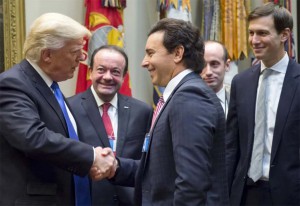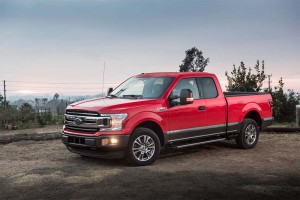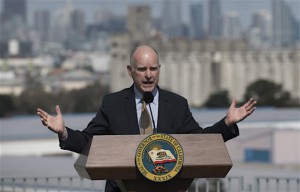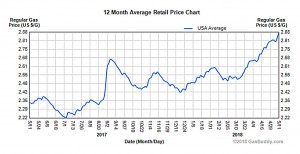
Former Ford CEO Mark Fields generated controversy last year when he warned Pres. Trump CAFE could cost 1 million U.S. jobs.
Senior executives from ten of the auto industry’s largest manufacturers will be meeting with President Donald Trump at the White House today to discuss the administration’s plans to roll back federal fuel economy standards.
A draft proposal developed by the Environmental Protection Agency would freeze requirements at 2020 levels rather than continuing a phase-in established by the Obama White House that was set to reach 54.5 miles per gallon by 2025. The new target would come in somewhere in the low 40 mpg range and hold through 2026.
But the meeting could prove to be an anxious one. Consumer and environmental groups have been ramping up opposition and any announcement from the White House would come at a time when fuel prices are surging to levels not seen in years. Meanwhile, any rollback could pit the Trump Administration – and the auto industry – against California which is threatening to effectively stall the cuts by using authority given the state under the Clean Air Act of 1970.
“This is about health, it’s about life and death,” California Governor Jerry Brown said last week during a news conference announcing a lawsuit by 17 states and the District of Columbia aimed at blocking any rollback. Reducing the fuel economy target set as part of a rare industry/government/NGO compromise, he asserted, would be “profoundly dangerous.”
(Panel of advocates pushes to retain 54.5 mpg target. Click Here for more.)
Despite such threats, the White House effort, led by embattled EPA Administrator Scott Pruitt, appears to be moving forward, though it is unclear precisely when a specific announcement of a new plan will be announced.
The president himself has shown no sign of wavering from a position he staked out in March 2017 during a visit to Michigan where he asserted, “The assault on the American auto industry is over.” He subsequently held a White House meeting with a number of automotive leaders including former Ford CEO Mark Fields who warned that if the Corporate Average Fuel Economy, or CAFE, standard stood at 54.5 mpg a million American jobs could be lost.
His comments helped put Ford in the crosshairs as environmental and consumer groups geared up a campaign to retain the Obama mileage target. Earlier this week, groups including Greenpeace and the Sierra Club staged a series of rallies in Detroit to press their case, winding the day up by presenting petitions containing 250,000 pro-CAFE signatures at Ford World Headquarters in the Motor City suburb of Dearborn.
Ford officials now insist that Fields was not specifically calling for a relaxation of the mileage target. And, just yesterday, Ford Chairman Bill Ford told investors at the company’s annual meeting that “We are not asking the administration for a rollback.”
But Ford, the great-grandson of company founder Henry Ford, added that, “We want California at the table and we want one national standard.”
(Ford shifts position as it comes under fire from enviro advocates. Click Here for more.)
Under a waiver included in the 1970 Clean Air Act, California can set its own emissions standards and has traditionally targeted numbers higher than what the EPA has set. While that traditionally covers pollutants like smog-causing oxides of nitrogen, California can also tighten limits on vehicle carbon dioxide emissions and, because CO2 is a direct byproduct of burning fossil fuels, the lower the mandated number the higher the required mileage.
California is the largest single market for motor vehicles in the U.S., giving it plenty of clout, and that’s enhanced by the fact that 12 other states have adopted its standards, rather than the EPA’s, collectively representing nearly a third of the new cars, trucks and crossovers sold in the U.S. each year.
California agreed to fall in line with the rest of the country on the Obama-era mileage standards and Mary Nichols, the head of the powerful California Air Resources Board, has expressed a willingness to listen to any plan cutting CAFE, but she also has made it clear she is skeptical and may not go along. If the state chose not to, using CO2 emissions numbers to retain the 54.5 mpg target, automakers would likely be forced to go along, analysts like Dave Cole, of the Center for Automotive Research, have said, no matter what the EPA does.
Administrator Pruitt has indicated he may push to have the California waiver eliminated, a threat that triggered the multi-state lawsuit. It has also chilled auto industry leaders who have been seeking a way to get the CAFE numbers cut while somehow not seeming to be pushing for a reduction – or at least a drastic one.
“We support standards that increase year over year that also are consistent with marketplace realities,” Mitch Bainwol, chief executive of the Alliance of Automobile Manufacturers, told a House committee during a meeting earlier this week.

Automakers contend rising truck sales make it hard to meet CAFE. They also brag about rising truck mileage, this F-150 Diesel hitting 30 mpg.
Automakers also don’t want to be seen as splitting with the president, some insiders suggest. Then-candidate Trump criticized a number of manufacturers, including General Motors and Toyota, and Ford particular hard, during the campaign. And it was seen as a quid-pro-quo that fuel economy standards would be reduced if more vehicles production – and jobs – were moved back to the States.
Automakers continue to warn that hitting 54.5 mpg would be a major challenge and likely raise the price of a new vehicle substantially. Complicating the effort has been the rapid and massive shift in the U.S. market from sedans, coupes and hatchbacks to SUVs, CUVs and pickups. That said, the mileage gap is far narrower than it used to be. Ford, for example, recently launched a diesel version of its full-size F-150 pickup getting over 30 mpg.
The automaker also announced last month that it is largely abandoning passenger cars in favor much higher-profit trucks, and other manufacturers are also shifting their model mixes. Anything that could force them to continue to produce cars that the public doesn’t necessarily want – likely requiring a ramp-up of incentives – would hurt the collective industry bottom line.
(Rising demand, shrinking supply causing surge in fuel prices. Click Here for more.)
The debate over CAFE is further complicated by the sharp rise in fuel prices. According to tracking service GasBuddy.com, prices have risen an average of around 40 cents a gallon over the past two months and now stands near $2.90 for a gallon of unleaded nationwide. Many expect that to soon surge past $3 and possibly even approach the $4 record not seen since 2011.
Announcing a reduction in mileage standards with gas topping $3 could be a “PR disaster,” one senior Detroit executive, asking not to be identified by name, said earlier this month. The White House might shrug it off as just one more controversy, but the fear in the industry is a backlash against automakers seen as supporting a rollback.


